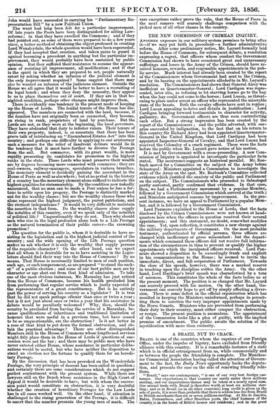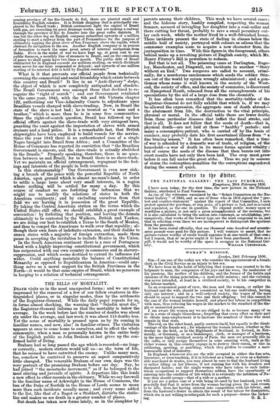A BRAZIL NUT TO CRACK.
Bairn is one of the countries whom the caprices of our Foreign Office, under the impulse of bigotry, have excluded from friendly alliance with this country. It is a remarkable instance of a state which is in official estrangement from us, while commercially and as between the people the friendship is complete. The Manches- ter Commercial Association having called the attention of Govern- ment to the fact, the Daily News opportunely backs the deputa- tion, and presents the case on the side of renewing friendly rela- tions.
"Brazil," says our contemporary, " is one of our very best foreign cus- tomers. Our exportations to that country are rarely under three- millions sterling, and our importations thence may be taken at a nearly equal sum. Our annual trade with Brazil is therefore worth at least six nullions ster- ling; and as in Brazil (as in. all other countries) long credit is given on the sale of goods, it is more than probable that there is seldom less due from Brazil to British merchants than six or seven millions sterling. At Rio de Janeiro, Bahia, Pernambuco, and other Brazilian ports, the chief business of the country is in the hands of British houses and residents ; and in the great grazing province of the Rio Grande do Sul, there are planted small and flourishing English colonies. It is British shipping that is principally em- ployed in the Brazil trade; British contractors light the capital of Brazil with gas, are executing its great drainage works, and are king a railway through the province of Rio de Janeiro into the great coffee districts. It was but the other day an English company subscri.bd upwards of a million sterling to start a railway from the port of Pernambuco for the purpose of ultimately tapping the great river of San Francisco above the rapids, which obstruct its navigation to the sea. Another English company is in process of formation to reach the same great artery of internal navigation from Bahia. Even in the midst of war we have kept up, at great cost to our public finances, a monthly line of steamers to Bread" , and on the conclusion of peace we, shall again have two lines a month. The public debt of Brazil contracted for in England exceeds six millions sterling, on which dividends were never for-one hour suspended or delayed ; and upwards of one million sterling of its internal debt is held by English residents."
What is it that prevents our official people from technically crowning the commercial and seeial friendship which exists between this country and Brazil ? It lies in an "Anti-Slavery" dodge, the object of which is now completely antiquated and obsolete. The Brazil Gaverninent was amongst those that declined to re- cognize the " right of search" ; and our Government retaliated in the same year; 1845, with the 8th. and 9th Victoria chapter 122, authorizing our Vice-Admiralty Courts to adjudicate upon Brazilian vessels charged with slave-trading. Now, in Brazil the state of the slave is not bad ; he is treated as "a man and a brother," which is more than he is in some free communities. Since the right-of-search question, Brazil has followed up her official efforts against the slave-trade with very stringent laws, guarding the coast against the importation of slaves with armed cruisers and a land police. It is a remarkable fact, that British shipwrights have been employed to build vessels for the service. Since the year 1842 there is no authenticated case of a single Negro brought into Brazil from Africa ; and a Committee of the House of Commons has reported ite conviction that "the Brazilian Government is. sincere, and the slave-trade in actually abolished in the Brazils." -Properly- speaking, therefore, there is no ques-. ben. between us and Brazil; for in Brazil there is-no slave-trade. Yet we maintain an official estrangement, repugnant to the feel- ings and interests of the people in both countries. Is this statesmanship ? Our Government is even now risk- ing a breach of the peace with the powerful Republic of North America, upon ground which is ahnost no-man's-land, in order to settle it large issue about very small interests, ins region where nothing will be settled for many a day. By this course, of conduct we are forfeiting the influences that we might use to -modify the relations of states in both the American continents ; and by excluding ourselves from that field lye- are letiAring it in possession of the great Republic, By taking the Central American station on the terms which the United States still offer, we should establish a great example of convention? by forfeiting that position, and leaving the domain ultimately to be contested by the Walkers, British and Yankee, we are doing our best to establish a Texas to the South of Mexico, and thus to compel the Americans to walk over that republic ; al- though their own fears of indefinite extension, and their dislike to annex states with a majority of foreign extraction, made them pause in accepting the invitation to include Mexico in the Union.
In the South American continent there is a race of Portuguese blood with a highly improving constitutional government, which has cooperated with our own country in commerce and in slavery- suppression, and which seems destined to extend its influence yet wider. Could anything maintain the balance of Constitutional Monarchy as opposed to Bepnblicanism in America—could any- thing serve as a moral support for the British Provinces in the North—it would be that same empire of Brazil, which we persevere in keeping to a relation of technical estrangement.



























 Previous page
Previous page